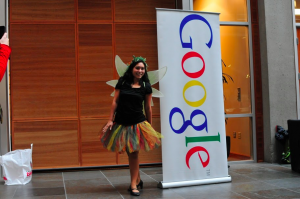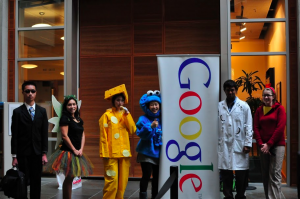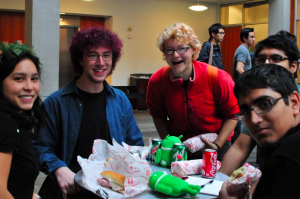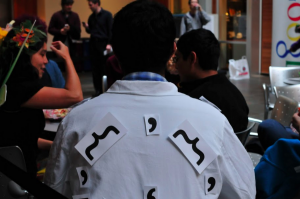 THE UNIVERSITY OF WASHINGTON!!!!!
THE UNIVERSITY OF WASHINGTON!!!!!
This synthetic biology student competition has taken place annually since 2003.
Read about the championship competition here. See the members of the UW team here. Team wiki here. UW Today article here. GeekWire here. Read more →
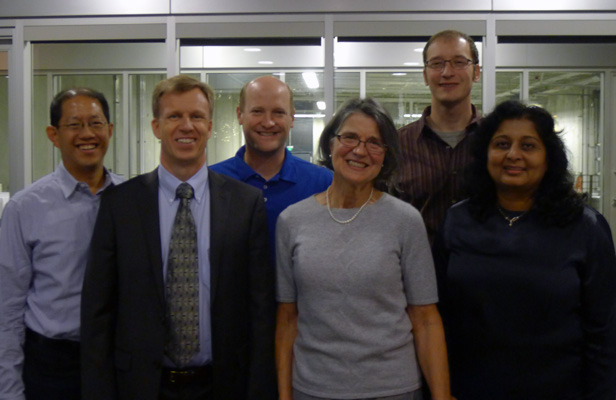
Susan and some of her Ph.D. alums
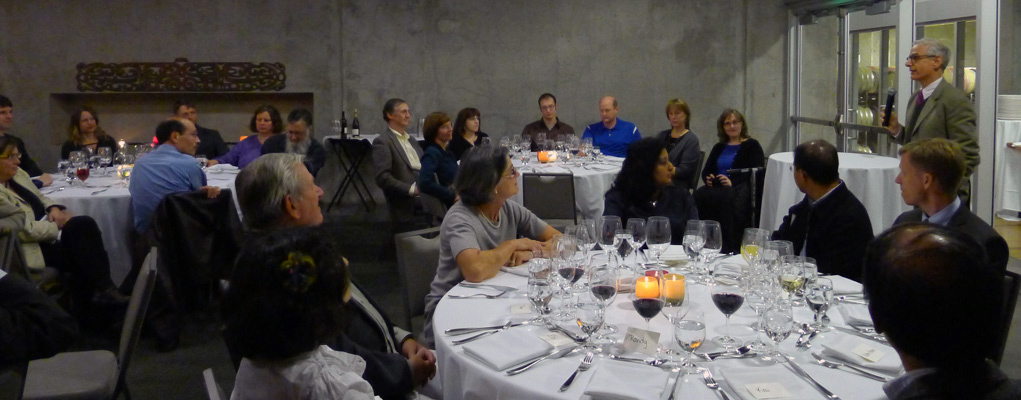
Randy Katz celebrates Susan
Saturday marked the retirement celebration for long-time UW CSE professor Susan Eggers.
Susan, a leading computer architect and Member of the National Academy of Engineering, was honored by CSE faculty and staff, former students, her Berkeley Ph.D. advisor Randy Katz (Susan was Randy’s second Ph.D. student; his first, Gaetano Borriello, is also on the UW CSE faculty), and former Berkeley graduate school colleagues including Jim Larus.
Thank you, Susan, for all you’ve done to make UW CSE a special place.
More photos here! Read more →
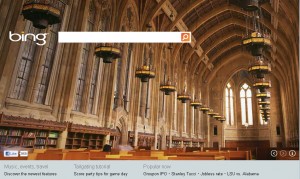 November 4 2011 marks the 150th anniversary of the University of Washington (not to mention the 62nd birthday of UW President Michael Young). Our friends at Bing have chosen a photograph of the Graduate Reading Room of Suzzallo Library to commemorate the day. Thanks Bing! And congratulations UW!
November 4 2011 marks the 150th anniversary of the University of Washington (not to mention the 62nd birthday of UW President Michael Young). Our friends at Bing have chosen a photograph of the Graduate Reading Room of Suzzallo Library to commemorate the day. Thanks Bing! And congratulations UW!
Read more →
 “Should you buy that new camera now, or wait and see if the price drops a little more? That’s the decision Seattle startup Decide.com wants to help you answer…
“Should you buy that new camera now, or wait and see if the price drops a little more? That’s the decision Seattle startup Decide.com wants to help you answer…
“The startup was co-founded by Oren Etzioni, founder of Farecast and a computer science professor at the University of Washington, and two sets of [UW alumni] brothers, Brian and Ian Ma, and Hsu Han and Hsu Ken Ooi.”
Read more here. Read more →
 “Cloudera founder Christophe Bisciglia is debuting his new startup today, called Odiago. Odiago develops a product called WibiData, which leverages Apache Hadoop to manage and analyze large amounts of data. And the company is launching with a number of major backers including Google Chairman Eric Schmidt, Cloudera CEO Mike Olson, and SV Angel.”
“Cloudera founder Christophe Bisciglia is debuting his new startup today, called Odiago. Odiago develops a product called WibiData, which leverages Apache Hadoop to manage and analyze large amounts of data. And the company is launching with a number of major backers including Google Chairman Eric Schmidt, Cloudera CEO Mike Olson, and SV Angel.”
Christophe received his Bachelors degree from UW CSE in 2003 and joined Google. In 2007, he returned to UW on his Google 20% time to create the nation’s first “Google-scale programming” course, which landed him on the cover of Business Week and stimulated Google and IBM to invest in an Academic Datacenter Initiative to spread the curriculum – an effort later joined by the National Science Foundation.
In 2008, with the support of Eric Schmidt, Christophe left Google to found Cloudera, now the leading provider of Apache Hadoop-based software and services. (Hadoop had been co-developed by UW CSE Ph.D. alum Mike Cafarella, now a faculty member at the University of Michigan, and Doug Cutting, now at Cloudera.) Christophe lured Aaron Kimball, a UW CSE graduate student who had worked with him on the course, to take a leave of absence and join Cloudera.
In 2010, Christophe and Aaron left Cloudera to found Odiago. UW CSE alum Garrett Wu is also on the Odiago team.
Read the TechCrunch post here. A more technical description of Odiago’s WibiData offering appears in DBMS2 here. Read more →
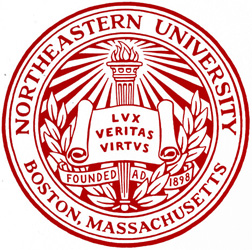
 Following up on a Seattle Times article announcing that Northeastern University is contemplating opening a campus in Seattle to offer master’s degrees in information assurance, health informatics and computer science, GeekWire interviews Northeastern’s senior strategist and market development officer, Sean Gallagher, and UW CSE’s Ed Lazowska.
Following up on a Seattle Times article announcing that Northeastern University is contemplating opening a campus in Seattle to offer master’s degrees in information assurance, health informatics and computer science, GeekWire interviews Northeastern’s senior strategist and market development officer, Sean Gallagher, and UW CSE’s Ed Lazowska.
Gallagher: “The Seattle metro area has been a leader in job creation and the growth of its knowledge economy … There has been rapid and sustained growth in Seattle and in the state in jobs preferring or requiring a master’s degree, and given state budget cuts and other dynamics, the demand for educated professionals exceeds supply.”
Lazowska … tells GeekWire that he welcomes additional educational opportunities. He points out that there is lots of demand from students and employers.
Lazowska: “We have one of the nation’s top undergraduate programs, one of the nation’s top graduate programs, and one of the nation’s top professional masters degree programs. Students who want to work at Microsoft or Amazon.com or Google or startups, or who are currently working there and want to gain additional education, are not going to choose Northeastern over UW, even independent of the significant tuition differential. The tragedy is that there isn’t more of us to go around. This leaves highly qualified individuals who live here with insufficient options.”
Read the GeekWire post here. Read more →
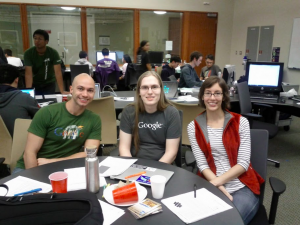
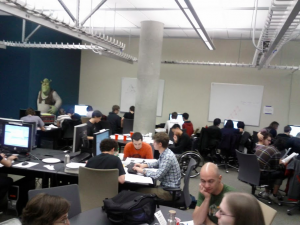 On Saturday, Google sponsored the UW round of the ACM International Intercollegiate Programming Contest.
On Saturday, Google sponsored the UW round of the ACM International Intercollegiate Programming Contest.
30 teams competed in the contest, organized by UW CSE’s Stuart Reges, assisted by UW CSE faculty colleagues Marty Stepp and Helene Martin; UW CSE students Victoria Wagner, Janette Sui, Shiny Yang, and Catriona Scott; and UW CSE Google alums Kevin Wallace and Ethan Apter. Google provide food, prizes, and swag.
The top five teams have won the honor of representing UW at the regional contest, which will be held November 5th:
- #1: chaos: James Athappilly, Yusuke Tsutsumi, Miles Sackler
- #2: Team SNAp: Nathaniel Mote, Alex Bykov, Stanley Wang
- #3: The ? Ternary : Operators: Jeff Booth, Craig Macomber, Vikram Kudva
- #4: Team Factory Factory: Kellen Donohue, Zach Stein, Conrad Meyer
- #5: StUdLyCaPs: Jenny Abrahamson, David Bergsman, Greg Bigelow
Detailed results and information on the problems here. Read more →
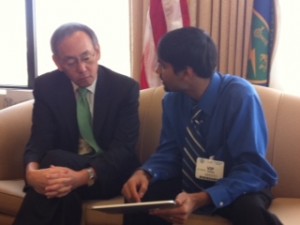 Hot on the heels of his Saturday night appearance on the field and scoreboard of Husky Stadium, UW CSE’s Shwetak Patel found his way to Washington DC to demonstrate his ElectriSense and HydroSense sustainability sensing technology to Secretary of Energy (and Nobel Laureate) Steven Chu.
Hot on the heels of his Saturday night appearance on the field and scoreboard of Husky Stadium, UW CSE’s Shwetak Patel found his way to Washington DC to demonstrate his ElectriSense and HydroSense sustainability sensing technology to Secretary of Energy (and Nobel Laureate) Steven Chu.
Back-channel from a Department of Energy person at the meeting: “Had the Secretary interested – made him 15 minutes late for his next meeting! Good opportunity to discuss learning algorithms and other CS issues.” Read more →
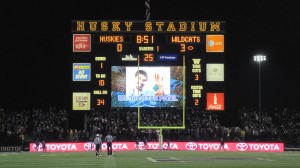
Shwetak on the scoreboard

Julie Kientz, Shwetak Patel, and UW President Michael Young on the scoreboard
Huskies over Wildcats 42-30? Nice.
Shwetak Patel on the Husky Stadium scoreboard? Priceless!
UW CSE’s Shwetak Patel was recognized at this evening’s game as the University of Washington’s newest MacArthur Foundation “Genius Award” winner.
Congratulations Shwetak!
Additional photos here.
And a note from CMU MacArthur winner Luis von Ahn:
From: Luis von Ahn
Date: Sun, Oct 30, 2011 at 10:22 AM
Subject: Shwetak
To: Ed Lazowska
Husky stadium for Shwetak? Man, you guys do it right.
When I got a MacArthur, what they said was "Don't let it go to your head" :)
Read more →
 THE UNIVERSITY OF WASHINGTON!!!!!
THE UNIVERSITY OF WASHINGTON!!!!!








